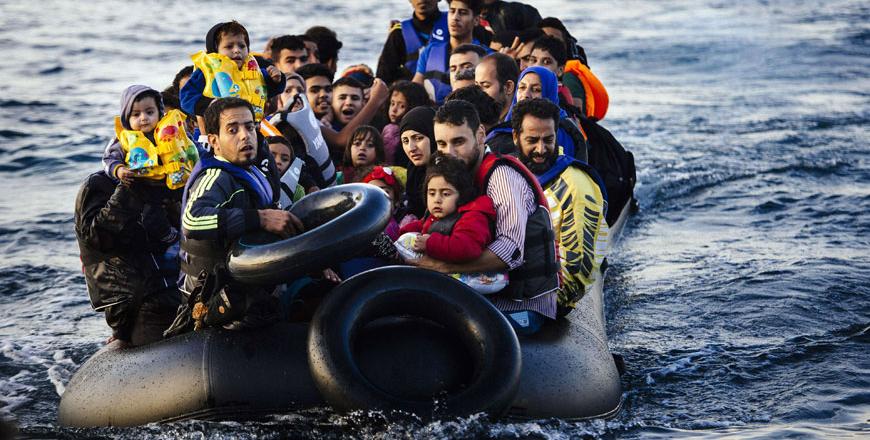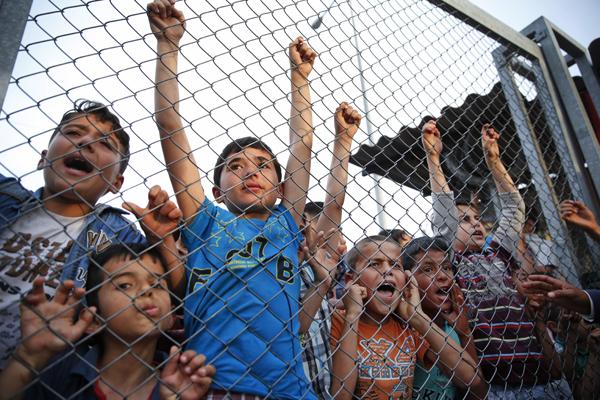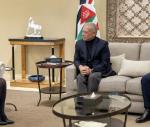You are here
Turkey seeks EU visa deal for cooperation on migrants
By Reuters - Oct 15,2015 - Last updated at Oct 15,2015

Migrants and refugees arrive on a dinghy on the Greek island of Lesbos, after crossing the Aegean Sea from Turkey, on Wednesday (AFP photo)
BRUSSELS —Turkey demanded on Thursday that the European Union start easing restrictions next year on Turks travelling to the European Union if it wants full cooperation to stem the flow of Syrian refugees and other migrants from its territory to Europe.
As EU leaders held a summit in Brussels dominated by talk of concessions to Turkey in return for Turkish help on the migration crisis, Prime Minister Ahmet Davutoglu said Ankara would not finalise a previously drafted agreement to take back migrants rejected by the EU without progress on the visa issue.
"We will not sign the readmission agreement before steps are taken on the Schengen visa and thus a visa liberalisation is secured for Turkish citizens," he told a television interviewer, saying he wanted a deal by the first half of next year.
Parallel, linked agreements on readmission and visa-free travel were made in late 2013, laying out conditions to be met, and expectations, that would take some three to four years.
As the summit got under way in Brussels, where EU leaders are considering offers to make visas easier for some Turks, French President Francois Hollande said of the Turkish demand: "Just because we want Turkey to help us by keeping back refugees, we mustn't ease restrictions unconditionally... So there will be a proposal that will set many conditions."
European Commission President Jean-Claude Juncker said EU negotiators made progress in new talks in Turkey. "It's moving in the right direction," said the EU chief executive, who last week in Brussels presented Turkish President Recep Tayyip Erdogan with a draft joint "action plan" for cooperation on migration.
Chancellor Angela Merkel told the German parliament before leaving for the summit that Europe needed to offer better support to help Turkey deal with the influx of refugees from war-torn neighbours. Over two million Syrians are in Turkey.
"Without a doubt Turkey plays a key role," said Merkel, who will visit Ankara on Sunday. "Most war refugees that come to Europe travel via Turkey. We won't be able to order and stem the refugee movement without working together with Turkey."
But embracing Turkey and especially Erdogan presents EU leaders with dilemmas. In years of talks on Turkey joining the bloc, the EU has constantly said Ankara fails to respect human rights and many accuse Erdogan of further undermining them.
"In our neighbourhood, we are not asking any more for fundamental rights after the Arab Spring," said a senior EU political leader. "We are asking for stability."
Many, notably in Berlin and Paris, doubt the wisdom of ever letting such a populous, poorer and Muslim country into the Union. Yet the EU is desperate now for Turkey's help and ready to meet some of Erdogan's demands, notably for easier travel for Turks to the EU, economic cooperation and diplomatic goodwill.
Efforts to end the division of Cyprus between the Greek-speaking state that is an EU member and the Turkish-backed one in the north of the eastern Mediterranean island are also a factor in relations. EU diplomats worry that Erdogan may use the migration crisis as added leverage.
"We understand the added value of Turkey," one said. "But we cannot give it carte blanche."
‘Guarantees’
Adding to uncertainties in negotiating any deal with Turkey is the turmoil that followed a bombing Ankara blames on either Kurds or Syria-based Islamists, as well as a snap parliamentary election on November 1 that will determine Erdogan's future power.
European Council President Donald Tusk, before chairing the summit, said: We need... guarantees that Turkey's response to our offer will be as substantive as ours."
Pouring cold water on Turkish calls for Europe to support its proposals for "safe zones" for refugees in northern Syria, Tusk said he wanted to focus on "more realistic targets". He noted that Russia's recent military intervention in Syria complicated matters, given Moscow's opposition to safe zones.
The EU is offering Turkey additional funding to help build facilities for the large numbers of Syrians it has taken in. It is also considering easing visa conditions for Turks, at first for business travel and possibly students — though this is bound up with legal benchmarks in the EU accession process.
Diplomats say the visa issue is important for Ankara, as is a general willingness to lend Erdogan international prestige.
Draft conclusions of the summit, seen by Reuters, read: "Successful implementation will contribute to accelerating the fulfilment of the visa liberalisation roadmap. The EU and its member states stand ready to increase cooperation with Turkey within the established framework and step up their political and financial engagement substantially."
Related Articles
GAZIANTEP, Turkey — Turkey stood its ground over the contentious issue of visa-free travel for its citizens on Saturday, warning German Chan
BRUSSELS — Turkey will help stem the flow of migrants to Europe in return for cash, visas and renewed talks on joining the EU in a deal stru
GENEVA/BRUSSELS — The United Nations and human rights groups warned on Tuesday that a tentative European Union deal to send back all irregul


















